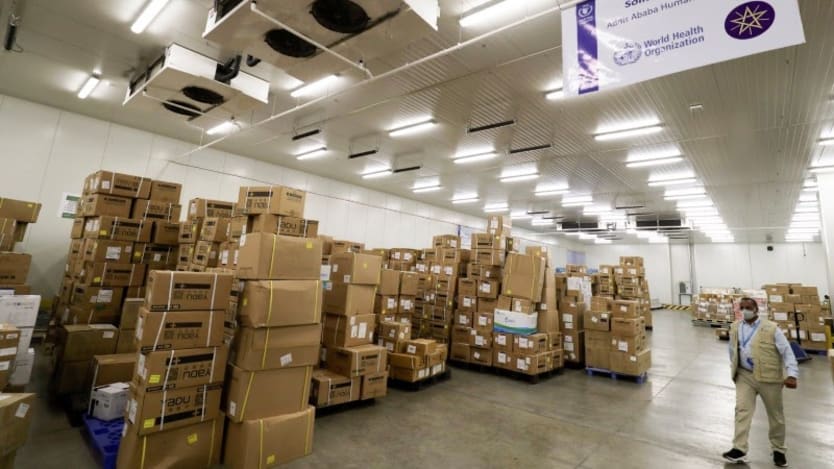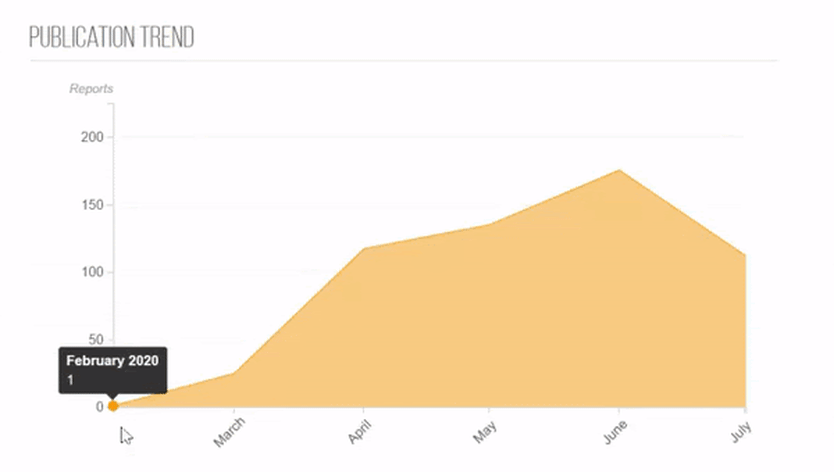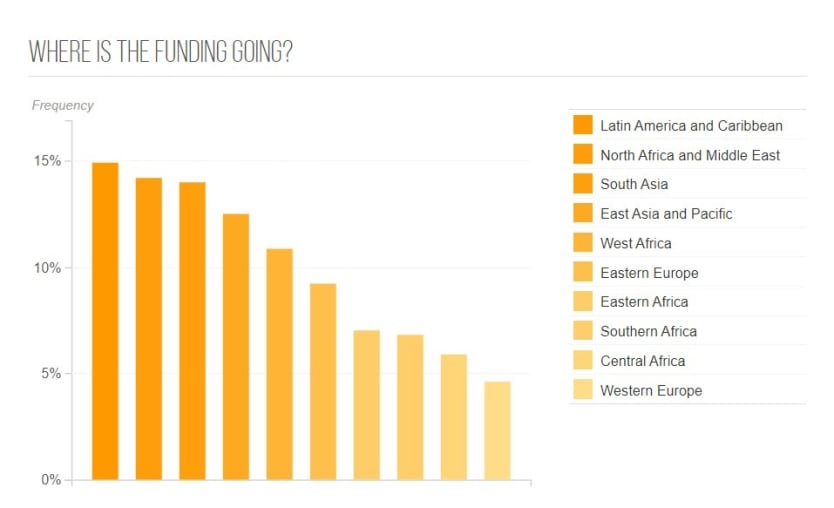
The unprecedented nature of the coronavirus crisis has impacted more than 190 countries, 89% of which are in economic recessions caused by a drastic decline in trade and tourism and a rapid increase in public debt. The pandemic is not just a major health crisis; it has also had ripple effects for economies, societies, human welfare, and the environment.
We’ve lifted our paywall on all COVID-19 articles. Looking for more in-depth global development coverage? Please consider supporting our journalism with a Pro subscription.
Large-scale responses by multilateral development banks, governments, and international agencies are combating its impacts. According to Devex’s analysis of COVID-19 funding announcements, more than $20 trillion has been committed for the immediate and long-term COVID-19 response since January.
The United Nations has been at the forefront of these responses since the start of the pandemic. In this analysis, Devex dives into procurement activity related to the U.N.’s support of COVID-19 response and crisis recovery operations, projects, and programs. This is an overview of the organization’s procurement priorities, its COVID-19 response, and top COVID-19 procurement opportunities published on Devex’s funding platform.
What do we know about UN procurement?
The U.N. recently released its “Annual Statistical Report on United Nations Procurement” for 2019, providing an overview of the procurement made to support its operations and projects. A total of $19.9 billion was spent on goods and services — a 5.9% increase compared with 2018.
Among the U.N. agencies, UNICEF was the largest procurer of goods and services at $3.8 billion in 2019, followed by the World Food Programme at $3.6 billion and the United Nations Procurement Division with $2.5 billion.
Both in the case of UNICEF and the World Health Organization, the rise in overall spending can be attributed to increased procurement in the health sector — specifically, notices for pharmaceuticals, contraceptives, and vaccines, worth a total of $3.2 billion. This was followed by transportation, storage, and mail service at $2.7 billion and then food and beverage products at $2.1 billion.
Interactive: Who's funding the COVID-19 response and what are the priorities?
As funding activities in support of the COVID-19 response transition from words into action, our analysis of funding data is transitioning with it. Here's the latest.
2019 saw an increase of $243 million in pharmaceuticals, contraceptives, and vaccines, which was largely due to the procurement of immunomodulating drugs by UNICEF with $206 million, the Pan American Health Organization with $78 million, and WHO with $45 million. India was the U.N.’s main supplier country of pharmaceuticals, contraceptives, and vaccines at $829 million, while Pfizer was the most awarded supplier in this sector at $363 million.
Procurement from developing countries, countries with economies in transition, and least developed countries also increased from $11.7 billion in 2018 to $12.3 billion in 2019, consistent with the U.N’s commitment to extending opportunities to them.
Highlighting the ‘comprehensive response to COVID-19’
The U.N., through its different agencies, has been leading the global health response, including by providing operational support to governments and partners across the globe, calling for $6.7 billion in humanitarian funding, and launching a “comprehensive response to COVID-19.”
Since the start of the pandemic, the U.N has approached the response holistically, solving health, humanitarian, and development issues. This has been based on three pillars and costed response plans.
The first is the coordinated and comprehensive health response led by WHO and the “strategic preparedness and response plan,” which needs $1.74 billion in funding until December 2020.
MDBs: Fast-tracking procurement in the time of COVID-19
Multilateral development banks have been among the fastest donors in mobilizing COVID-19 funding and accelerating procurement. Find out how they're doing this and where the money is going.
The second is the adoption of policies addressing socioeconomic, humanitarian, and human rights aspects of the crisis through $7.32 billion in funding to effectively execute the “global humanitarian response plan” coordinated by the U.N. Office for the Coordination of Humanitarian Affairs.
And the third is a recovery process for a better future that needs $1 billion for the COVID-19 response and recovery funds and the Sustainable Development Agenda.
The pillars and responses were shaped through different policy briefs focusing on vulnerable population groups, regions facing particular challenges, and key thematic areas.
For a streamlined and effective delivery of the response, the U.N brought together key decision-makers to scale up the supply and procurement management and created a supply chain task force that oversees the COVID-19 Supply Chain System. This can be accessed through the supply portal and catalog.

What are the different COVID-19 procurement priorities?
The U.N. system has been supporting governments with their COVID-19 responses, and procuring goods and services through tender announcements has been one of the organization’s primary tools. As of July, Devex has tracked a total of 546 coronavirus-related tenders from the U.N., with India seeing the most at 39. Since their budgets are not always indicated, the total value of these procurements is unknown.
Visualizing the data: United Nations’ COVID-19 tenders
See data visualizations for COVID-19 tenders from the U.N. on Devex’s funding platform.
Most of these procurements involve equipment purchasing, manufacturing, and consulting services. As in previous years, procurement of health goods and services is mainly handled by UNICEF, which has become one of the main purchasing agencies during the pandemic.
Devex has analyzed the public tenders related to COVID-19 and identified the four main categories:

Personal protective equipment. As of June, over 250 million pieces of PPE have been shipped or in the process of being shipped by the U.N. supply chain team. In April, the organization released its largest tender so far, which sought to consolidate demand from participating U.N. agencies and other NGOs using an agile approach and with several deadlines for suppliers to present their offers.
PPE tenders that are currently active can be found for Afghanistan, Bahrain, and Lebanon.
Psychological support. With the widespread distress brought by the pandemic, U.N. agencies are scaling up their mental health and psychosocial response for health workers and vulnerable populations. An example of this is a tender for “psycho-social and legal support for COVID-19 crisis response” in Bangladesh, focused on providing mental health support to front-line workers, adolescents, and women.
Impact studies. Reliable data and analysis of different sectors are crucial for decisions and effective policymaking, especially during this crisis. There are about 100 coronavirus-related opportunities focusing on impact assessments that are found in the funding search.
Of these, social, climate, and economic impact assessments are most common, including for the “impact of COVID-19 on most vulnerable households” in Jordan, “short-term economic effects of climate change plan post-COVID-19 recovery” in Costa Rica, and “initial economic assessment of COVID-19 effects and scope of policy options” in Belize.
Information and communication. A lack of accurate information can congest health data and hinder delivery of services, while access to timely and correct information plays a critical role in the collective response to COVID-19 and can save lives.
For instance, Nepal needs “services for information sharing and advocacy on COVID-19 preparedness, response, and recovery”; Pakistan seeks a “TV advertisement campaign for awareness on violence against women and girls in the context of COVID-19”; and Ecuador wants “chatbot services for information delivery on COVID-19.”
Find the U.N.’s’ funding announcements and open tender opportunities related to COVID-19 on Devex’s funding platform.
For access to in-depth analysis, insights, and funding opportunities from over 850+ sources — combined with Devex Pro news content — sign up to a Pro Funding subscription online today or get in touch to learn about our Pro Funding group options.









